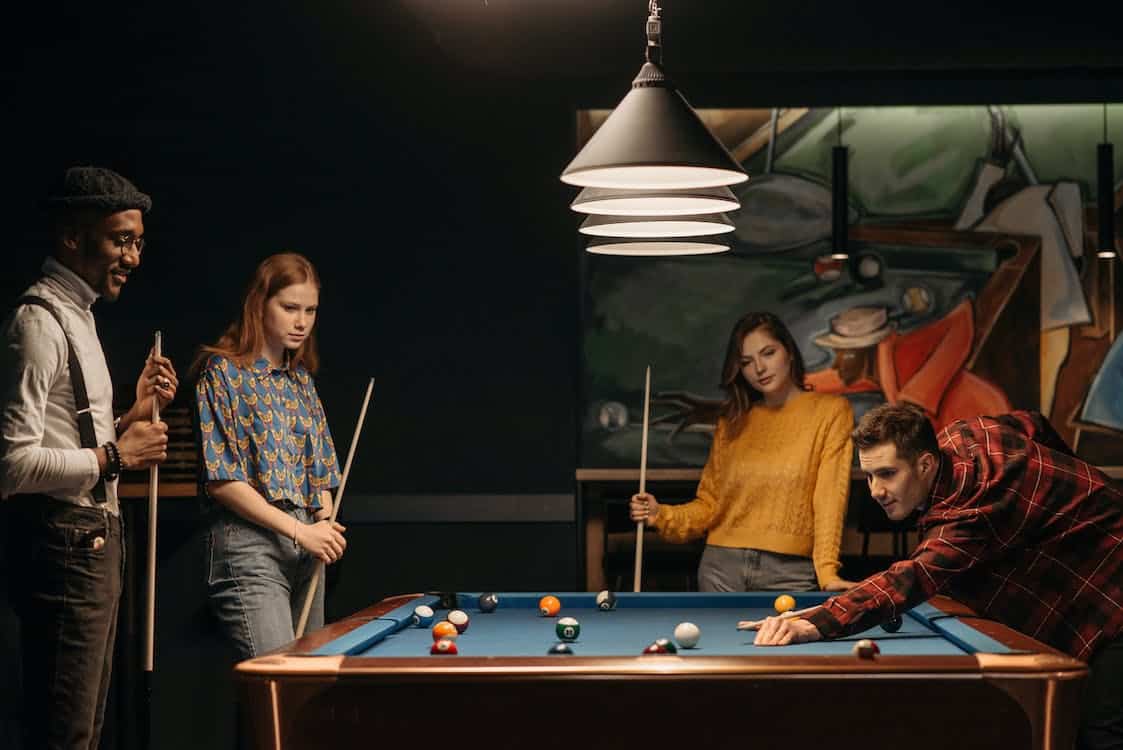
Pool, often referred to as billiards, is a classic game that combines skill, precision, and strategy. Whether you’re stepping into a pool hall for the first time or looking to improve your game, mastering the basics can pave the way for an enjoyable and rewarding experience. Here’s a comprehensive beginner’s guide to playing pool:
Table of Contents
Understanding the Basics
1. Get Familiar with the Equipment
- Pool Table: Familiarize yourself with the table layout, pockets, and rails.
- Cue Stick: Understand the different parts of the cue stick—tip, ferrule, shaft, and butt.
2. Learn the Rules
- Ball Types: Understand the differences between striped and solid balls, as well as the cue ball.
- Scoring: Learn how to pocket balls legally and the sequence of shots.
Features
| Part Number | 1 |
| Model | 1 |
| Warranty | Free replacement for 2 years. |
| Color | Set of 4 pieces |
| Size | 18oz 19oz 20oz 21oz |
Perfecting Your Technique
1. Stance and Grip
- Stance: Stand comfortably with one foot forward, ensuring stability.
- Grip: Hold the cue lightly with a relaxed grip to maintain control and accuracy.
2. Aim and Alignment
- Aiming: Focus on the object ball and visualize the path of the cue ball.
- Alignment: Ensure your body, cue, and eyes are aligned for accuracy.
3. Striking the Cue Ball
- Stroke: Practice a smooth, controlled stroke for consistent shots.
- Cue Ball Contact: Aim to hit the cue ball in the center for a straighter shot.
Essential Techniques to Practice
1. Practicing Basic Shots
- Straight Shots: Aim for simplicity by mastering straight shots initially.
- Bank Shots: Learn to bounce the cue ball off rails to pocket other balls.
2. Cue Ball Control
- English or Spin: Understand and practice using side spin (English) to control the cue ball’s path.
- Speed Control: Experiment with different speeds to understand how it affects ball movement.
3. Strategy and Positioning
- Planning Shots: Think ahead by planning the next shot and positioning the cue ball for optimal play.
- Safety Plays: Sometimes, opting for a defensive shot can be as important as pocketing a ball.
Additional Tips for Beginners
1. Practice Regularly
- Consistency: Regular practice enhances skill and confidence.
2. Watch and Learn
- Observation: Watch experienced players to learn new techniques and strategies.
3. Patience and Persistence
- Learning Curve: Understand that improvement takes time and patience.
- Mental Focus: Stay focused and calm during the game.
4. Enjoy the Game
- Have Fun: Remember that pool is a game, so enjoy the learning process and the game itself.
Conclusion
Playing pool is not just about hitting balls into pockets; it’s about finesse, strategy, and mastering the fundamentals. By understanding the equipment, practicing techniques, and staying patient, even beginners can improve their skills and enjoy the game.
Remember, like any skill, proficiency in pool comes with practice and dedication. Embrace the learning curve, stay persistent, and most importantly, have fun sinking those shots! Whether you’re playing casually with friends or aiming for competitive play, these foundational tips will set you on the path to becoming a proficient pool player.
FAQ
Solid and striped balls are two different sets of balls in pool. Players are typically assigned either solids or stripes. Solids are numbered 1 through 7, while stripes are numbered 9 through 15. The black ball, numbered 8, is commonly known as the “8-ball.”
Cue ball control involves mastering the spin and speed of the cue ball. Practice using side spin (English) to manipulate the cue ball’s path after contact with other balls or rails. Also, experiment with different stroke speeds to understand how they affect cue ball movement.
Aiming accurately involves focusing on the object ball and visualizing the cue ball’s path. Ensure proper alignment of your body, cue, and eyes towards the target. Practice consistently to develop a reliable aiming technique.
Beginners often struggle with inconsistent stance and grip, lack of cue ball control, and not planning shots in advance. Also, hitting the cue ball off-center or too hard/soft can affect shot accuracy.
Focus on planning your shots in advance. Consider the positioning of the cue ball for the next shot and anticipate your opponent’s moves. Learning defensive or safety plays can also enhance your strategy.
As a beginner, start with a cue stick that feels comfortable and suits your playing style. Ensure it has a smooth tip and is of decent quality. As you progress, you might explore cues with different tip sizes or materials.
A bank shot involves bouncing the cue ball off the rails to pocket other balls. Mastering bank shots expands your options during a game and allows you to make shots that might seem impossible with a direct hit.
Practice is crucial in honing your pool skills. Regular practice sessions help in refining your techniques, improving consistency, and developing confidence in your shots.
Remember that learning any skill takes time. Stay patient, focus on your progress, and view mistakes as learning opportunities. Take breaks if you feel frustrated and come back to the game with a fresh perspective.
Absolutely! Observing experienced players can offer insights into different techniques, strategies, and shot selections. You can learn a lot from their approaches and incorporate those learnings into your own game.


